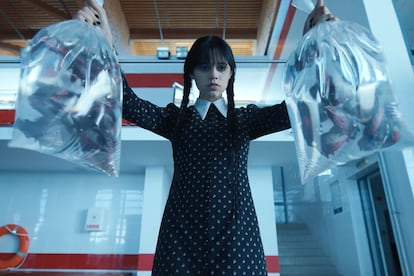The year everything changed for Netflix
The company, which built its name on a modern and friendly image, is now seen by many as just greedy. However, their new strategies seem to be working

Ten years ago, on February 1, 2013, Netflix premiered its first big international hit with an in-house production: House of Cards. The Los Gatos, California, company had started its foray into production one year earlier with the Norwegian series Lilyhammer, but it was the political drama starring Kevin Spacey and Robin Wright which officially kicked off the ambitious project. With House of Cards, the platform managed, in just a few years, to spearhead the streaming revolution.
Born in 1997 as a DVD-by-mail rental service, Netflix did not take long to make the leap to digital and become number one in its field, building its model on the image of a friendly company that even brought new life to titles discarded by other chains. It also boasted state-of-the-art technology and an algorithm that could both recommend series based on the user’s tastes and help find the next great international hit. Now, in a world as changing as the audiovisual industry, last year has redefined the company’s route – again. This is the story of the year in which everything changed for Netflix.
The alarms went off when in the presentation of results for the first quarter of 2022, the company announced that, for the first time in its history, it had lost subscribers. The Covid-19 pandemic had accelerated the boom in streaming and platforms were realizing in 2022 that the growth ceiling was, quite possibly, closer than they had imagined. The prospect of a new and steeper loss of subscribers for the next quarter made the company’s shares tumble. Shortly after, the platform announced it would lay off 150 employees. Then, in July, it was revealed that a million more subscribers had left between April and June 2022, less than the two million expected. These declines served as a tipping point: the streaming wars were entering a new phase in which unstoppable growth was no longer as essential as making the business profitable and financially sustainable.
In order to do this, Netflix focused on three main areas related to advertising, shared accounts and content. In March last year, the company’s CFO surprised the public by not ruling out the introduction of ads on the platform, which up to that moment had been taboo: “Never say never.” Not long after that hint, it was confirmed that they were working on an option with advertising, and in November – just six months later – Netflix launched its basic plan with ads, beating Disney+, whose ad-supported version became available in the United States in December.
According to data provided by the company in its latest presentation to investors, in the last quarter of 2022 it added 7.7 million subscribers, well above the 4.5 million it expected. The company has not detailed how many of them took advantage of the new cheaper option, but a report by the research and analytics firm Ampere Analysis estimates that 10% of the company’s new clients signed up for the add-supported version.

Another front on which Netflix has been working for years to achieve greater profitability is shared accounts. The company estimated that some 100 million people use its platform via someone else’s account, a practice that they themselves had encouraged through social media posts and advertising campaigns back when their goal was to gain market share. Now things have changed, and they are willing to take an initial backlash if it means benefits in the medium or long term. For months, the company tested in Chile, Costa Rica and Peru, a system that limited access to an account to the subscriber’s home (in other words, complying with what was stated in their use policies from the beginning) and requested an extra payment for each user that wanted to join. This February, Netflix started to use a similar system in four other countries: Canada, New Zealand, Portugal and Spain. “This will not be a universally popular move,” admitted Greg Peters, the new co-CEO of the platform along with Ted Sarandos, who also announced that they expect a backlash in the form of short-term cancellations, similar to what happens when their prices rose.
An image crisis
This backlash also includes an intangible blow to a company that has made its image one of its strengths. If HBO is known for the prestige and quality of its offer and Disney is associated with family content and its big brands, Netflix had opted for the modern, friendly image of a cool brand, which these latest changes have spoiled for some users.
The content is the other flank, an essential one to achieve the company’s goal of profitability. Until now, Netflix had followed a production model that sought to flood the market with continuous releases. However, in a letter to shareholders in January of this year, the company stated that it had already passed “the most intensive phase” in its creation of original programming; now the idea is to prioritize quality over quantity, although they must maintain a certain level of production to satisfy a hungry market that continually asks for more. Also key is which productions they choose to renew, for which they take into account how many users saw them in their first 28 days on the platform and how many got to the end of the season, in addition to their production costs and other factors.
With these open fronts, Netflix starts a year full of changes, including the departure of co-founder Reed Hastings as CEO. A new Netflix to compete in a saturated market, whose content production seems to have reached its ceiling and which, unlike other companies like Disney, Amazon or Apple, only has one salvation: its platform.
Sign up for our weekly newsletter to get more English-language news coverage from EL PAÍS USA Edition
Tu suscripción se está usando en otro dispositivo
¿Quieres añadir otro usuario a tu suscripción?
Si continúas leyendo en este dispositivo, no se podrá leer en el otro.
FlechaTu suscripción se está usando en otro dispositivo y solo puedes acceder a EL PAÍS desde un dispositivo a la vez.
Si quieres compartir tu cuenta, cambia tu suscripción a la modalidad Premium, así podrás añadir otro usuario. Cada uno accederá con su propia cuenta de email, lo que os permitirá personalizar vuestra experiencia en EL PAÍS.
¿Tienes una suscripción de empresa? Accede aquí para contratar más cuentas.
En el caso de no saber quién está usando tu cuenta, te recomendamos cambiar tu contraseña aquí.
Si decides continuar compartiendo tu cuenta, este mensaje se mostrará en tu dispositivo y en el de la otra persona que está usando tu cuenta de forma indefinida, afectando a tu experiencia de lectura. Puedes consultar aquí los términos y condiciones de la suscripción digital.









































